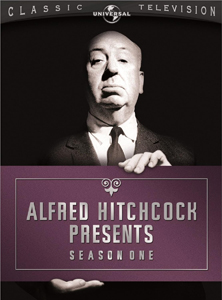Alfred Hitchcock’s macabre sense of humor had become a brand by the 1950s, and he smartly spun that into a TV series, “Alfred Hitchcock Presents.” Of the 39 episodes of Season 1 (1955-56, CBS), four are directed by Hitchcock, and they are all half-hour gems that had me grinning at the screen. (Out of the 361 episodes of “AHP” and “The Alfred Hitchcock Hour,” 18 are directed by Hitchcock. That’s often cited as a small number, but by today’s standards, it’s pretty neat that one of the greatest film directors of all time gave us these bonus mini-movies.)
The director didn’t invent “black humor” by any means, but he brought it to the mainstream and he had a knack for knowing which stories to adapt. John Collier is among the fiction writers who codified the art form, as editor Thomas Godfrey argues in the short-story collection “Murder for Christmas,” which I happen to have on my shelf:
“Collier, along with Stanley Ellin, Roald Dahl and Robert Bloch, formed the Four Horsemen of Contemporary Crime Fiction, a quartet descended from film noir and Cornell Woolrich, that perfected a distinctive style of mystery-suspense writing that still prevails.”

“Alfred Hitchcock Presents” Season 1 (1955-56)
CBS; 39 episodes (This review looks at the four directed by Hitchcock.)
Episodes: “Revenge” (1), “Breakdown” (7), “The Case of Mr. Pelham” (10), “Back for Christmas” (23)
Director: Alfred Hitchcock
Writers: Francis Cockrell (teleplays); Anthony Armstrong, Samuel Blas, John Collier, Louis Pollock (stories)
Stars: Vera Miles, Joseph Cotten, John Williams
That’s Godfrey’s introduction to Collier’s 1939 short story “Back for Christmas” (episode 23), adapted for TV by Francis Cockrell. John Williams (“Dial M for Murder”) ably trades his usual law-enforcement guise to move to the other side: He plays a husband nagged to death by his wife – but it will be her death in this case. Similar in vibe to “Dial M,” this is perfect black humor both in function (he checks the size of the hole in the cellar against his wife’s measurements), and in emotions, as we may chastise ourselves for being on the killer’s side, but we can’t help it.
“Back for Christmas” follows the Hitchcockian structure wherein we’re introduced to an out-of-the-ordinary situation (a spouse plans to kill his way out of a marriage) against a the backdrop of everyday life. We’re mesmerized as we see where it’s going, and – when we’re lucky, as is the case here – we get one last zinger to complete the narrative.
The lady’s sanity vanishes
Hitchcock always concludes the story, rather than leave it linger, but not always with a surprise twist (I’m thinking of something like “The Sixth Sense”), only with the grace note of a zinger. And sometimes not with much of a zinger, but we’re asked to merely further absorb the odd scenario. The writing of these stories is a process of careful calibration.

He kicks off “AHP” with “Revenge” (1), written by Cockrell from a story by Samuel Blas. “The Lady Vanishes” (1938) was an early example of the subgenre where a viewer wonders if a woman is insane or the world is insane. Here, Vera Miles (“Psycho”) has that role. She has mental health issues, especially as she gets more set in her routine as a housewife in a mobile home after her husband (Ralph Meeker) lands a steady 9-to-5’er.
Perhaps “Revenge” says something about the stultifying mundanity of Fifties housewife life for women not wired for it. Even without the theme, we have a mystery wherein the wife is (so it seems) attacked when home alone and then points the finger at a man. Her husband, trusting her rationality, gets caught in a web of falsity.
A more bizarre exploration of subjective realities is the sci-fi entry “The Case of Mr. Pelham” (10), with Cockrell adapting Anthony Armstrong’s story. Tom Ewell’s title character finds an exact doppelganger has been taking over his life. I correctly guessed the “twist,” but this is one of those respectable tales where we think about a deeper issue.
This is a metaphysical one. Scientists (and SF writers) have long theorized that there exist many multiverses that constantly branch off. “Pelham” asks “What if two branches remained in contact?” Then you could have this episode’s mind-boggling scenario.
They don’t Cotten to what’s going on
The (seemingly) simplest in structure of Hitchcock’s four Season 1 directorial efforts is “Breakdown” (7), with Cockrell and Louis Pollock adapting Pollock’s story. Joseph Cotten may have called his last filmic collaboration with Hitch “Under Corny Crap,” but he returned for this episode.
It mostly consists of Cotten’s William paralyzed in place after a car accident. OK, so the believability of the staging – from the cheaply portrayed accident to the way he is pinned by the steering wheel – is weak, but it doesn’t matter. This is still a fine piece of classy horror. Cotten gives voiceover narration of William’s thoughts as various people find him, but they assume him to be dead.
Censors were the bane – and fun challenge – of Hitchcock’s career, and TV was even more extreme than movies. People who have bad things happen to them – like William – are portrayed as bad people (He callously fires an employee earlier). And at the same time, writers weren’t allowed to be too cruel; murderers will be caught, but non-killers might be thrown a bone.
The censors couldn’t stop dark humor, though; they inadvertently enhanced it. “The Case of Mr. Pelham” fizzles to an ending – a sneak preview of “Frenzy’s” “You’re not wearing your tie.” But then Hitch (who introduces and concludes every episode, including those he doesn’t direct) comes on screen to play out a mini-plot wherein he himself has a double. The split-screen work here and in the episode proper is excellent.
Often, Hitch’s monologues are worth only a smirk, but the little plot here is hilariously dark. Like a lot of these anthology shows (1959’s “The Twilight Zone” became the most famous), probably not every episode was a total hit. But I can see why Fifties TV viewers came back every week for another meal of the strange and macabre … with a garnish of subversiveness.
RFMC’s Alfred Hitchcock series reviews works by the Master of Suspense, plus remakes and source material. Click here to visit our Hitchcock Zone.

